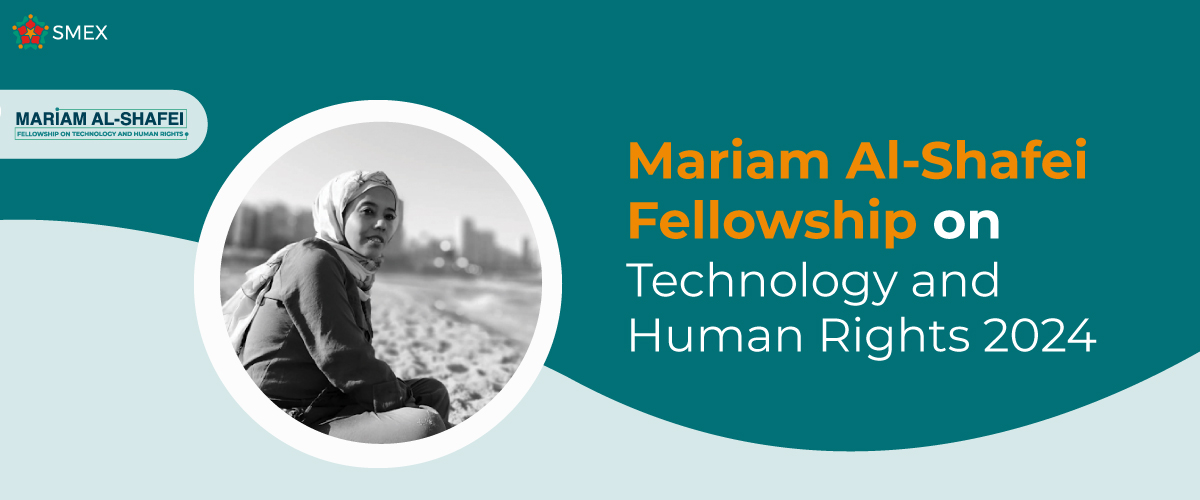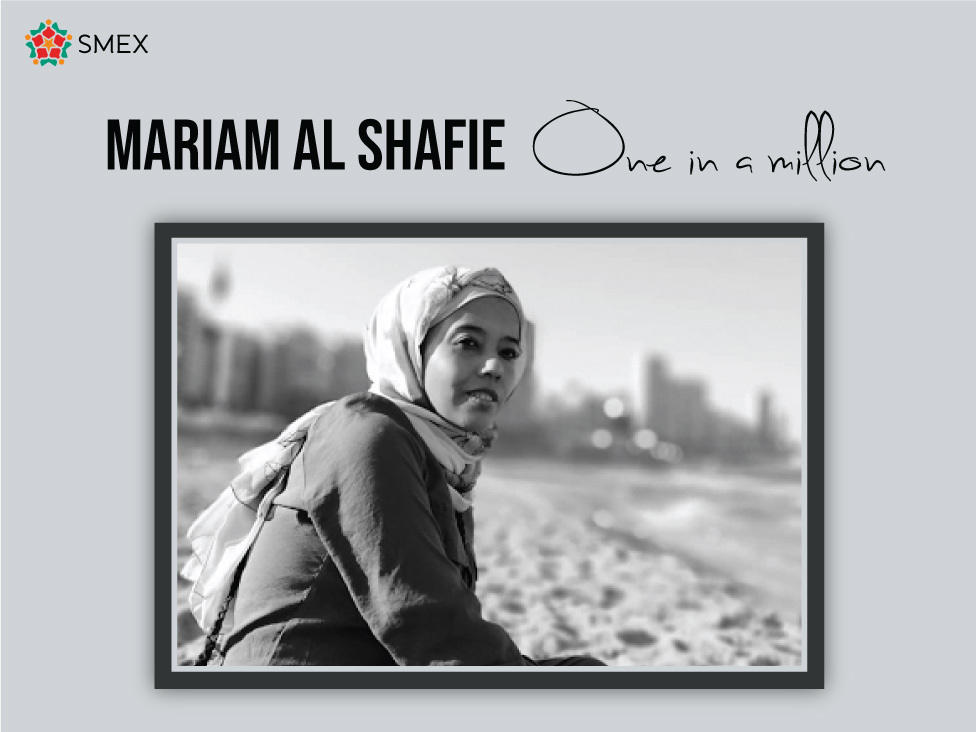SMEX welcomes applications for the Mariam Al-Shafei Fellowship on Technology and Human Rights for the year 2024. This fellowship commemorates the legacy of our beloved colleague Mariam Al-Shafei and brings together digital rights advocates from West Asia and North Africa to collaborate, research, innovate, and address issues and challenges at the intersection of technology and human rights in our region.
We invite fellows to undertake one-year research, policy analysis, or technology development projects based on their areas of interest and expertise. SMEX will offer technical mentorship, skills-building and networking opportunities, resources for research, advocacy support, and overall room for the fellows to endeavor on the topic of their choosing.
For the year 2024, SMEX will be welcoming five non-resident fellows committed to working on the following topics:
- Digital Resilience in the Global South
- Internet Governance in West Asia and North Africa
- Freedom of Expression in Lebanon
- Sexual and Reproductive Health Rights (SRHR) and Digital Rights
- Feminism and Digital Rights
About the Fellowship
The Mariam Al-Shafei Fellowship on Technology and Human Rights is open to early to mid-career candidates based in or with significant ties to West Asia and North Africa. Individuals whose work contributes to advancing civic issues at the intersection of technology and society, including data scientists, sociologists, policy experts, journalists, digital rights activists, economists, artists, and actors from relevant areas, are encouraged to apply. Since projects will heavily rely on research, we invite those currently enrolled in or recently completed postgraduate work to apply for this fellowship.
About Mariam Al-Shafei
This fellowship owes its name to our dear friend and colleague, Mariam Al-Shafei, who left this world on December 29, 2022. Mariam’s sudden death occurred just as SMEX was launching this fellowship, and she was part of the team that put it together. Renaming the fellowship in her name is a tribute to Mariam’s memory and contribution to the lives of everyone who knew her and those yet to know her story. Read more about Mariam Al-Shafei’s life and her championing of internet accessibility for people with language impairment.
What does SMEX expect from the fellows?
This 10-month, part-time fellowship requires a commitment of approximately 15 hours per week, including active participation in monthly virtual meetings. Fellows will report directly to the Fellowship Coordinator, maintaining regular communication with their line manager. They will work closely with mentors to create project plans and timelines. Progress reports highlighting challenges, lessons learned, and major achievements must be submitted monthly to SMEX, ensuring transparency and adaptability throughout the fellowship.
What does SMEX offer fellows?
- Working with a mentor who is a technical expert in a field related to the fellow’s topic
- Monthly meetings with a mentor and/or fellowship program manager to support the fellows as they execute their approved work plan, as well as quarterly convening for the entire cohort to share their progress and benefit from peer support and feedback
- A monthly stipend of $900 net
- Fully paid travel and accommodation to attend SMEX’s annual Bread&Net event
- Access to SMEX’s extensive digital rights network, including coalitions SMEX convenes and introductions to practitioners who may offer platforms and other opportunities for collaboration
- Training related to digital security and campaigning
- Additional funds may be available to cover costs associated with attending one additional conference or meeting of direct relevance to the topic researched and located in the WANA region
In addition to these benefits, it’s important to note that this is a non-resident fellowship program with remote engagement as the primary mode of interaction. Fellows will be invited to SMEX’s annual event, Bread&Net. Applicants selected from Beirut have the option to utilize SMEX’s resources at their offices. For fellows based abroad, there is the possibility of requesting an additional fixed Technology Stipend to cover IT costs, which can improve remote meeting participation and provide support for necessary digital resources. The fellowship program is designed to be flexible and dynamic, accommodating each fellow’s unique skills, interests, and experiences.
Eligibility and Criteria
Ideal candidates will have strong English and Arabic research, writing, and speaking skills. Applicants are expected to have demonstrable experience in and commitment to protecting and promoting digital rights and internet freedoms. The strongest candidates will have thought about how their project ‘grows the field’ of digital rights.
- Geographical Eligibility: Applicants should be based in or have significant ties to the West Asia and North Africa (WANA) region.
- Professional Background: The fellowship is open to early to mid-career professionals, including but not limited to data scientists, sociologists, policy experts, journalists, digital rights activists, economists, artists, and individuals from related fields.
- Education: Candidates currently enrolled in or have recently completed postgraduate studies are encouraged to apply, as the fellowship projects will require a research-oriented approach.
- Language Skills: Proficiency in English and Arabic, including strong research, writing, and speaking abilities, is essential.
- Commitment to Digital Rights: Applicants should demonstrate commitment to protecting and promoting digital rights and internet freedoms.
- Project Relevance: Ideal candidates will have thoughtfully considered how their proposed project contributes to advancing digital rights and meaningfully ‘growing the field.’
- Availability: Fellows must be available to commit approximately 15 hours per week to their fellowship responsibilities, including active participation in monthly virtual meetings.
- Collaborative Spirit: Fellows should be open to collaboration, peer support, and mentor engagement.
- Professional References: Applicants must provide contact information for two professional references who can speak to their qualifications and commitment.
These criteria ensure the fellowship is open to dedicated individuals with the right qualifications and commitment to advancing technology and human rights in the WANA region. Please carefully review these criteria before submitting your application.
2024 Fellows
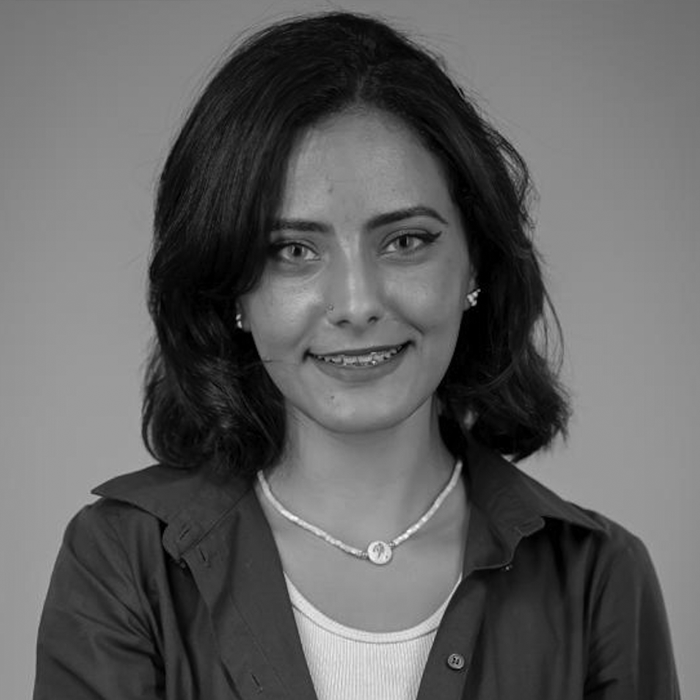
Aisha Aljaedy is a Yemeni feminist, human rights advocate, researcher, and writer. She is a BA candidate in Political Science with a focus in public and private international law at the American University in Cairo, where she is also minoring in Journalism and Anthropology. Aljaedy is a specialized trainer in Gender and Civic Engagement and has been a consultant for numerous research centers and feminist initiatives across the SWANA region.
Aisha is actively involved in volunteering and educational programs that focus on peacebuilding, gender, and minority issues. Her articles on gender-based violence and minority rights have been featured in regional and international publications. Aisha’s passion about culture and the arts led her to co-found the Takween Cultural Club in Yemen in 2017. She also enjoys blogging, improvisation, and is a believer in the therapeutic power of art.
Aisha Aljaedy’s research aims to delve into the digital threats faced by women’s rights defenders in Yemen. Drawing on her experience as a women’s and human rights defender, she will research the systematic causes of online bullying and harassment campaigns. By listening to women’s experiences, learning the ways they deal with digital threats, and how these threats have impacted them personally and professionally, Aljaedy will create a resilience toolkit consisting of preventative measures for women activists in Yemen and the diaspora. Inspired by the legacy of Mariam Al-Shafei, Aisha seeks to use technology to support women defenders in Yemen, where digital literacy is still an evolving issue, especially in conflict-affected areas.

Mohammad Abobakr, a MEPI TLU scholar, graduated from the American University of Beirut with a degree in Business Administration. He has engaged in renewable energy projects with the Lebanese Center for Energy Conservation (LCEC), conducted research with ESCWA, and earned recognition, including the Tomorrow’s Leaders CSP Excellence Award, and won first place in the OSB Design2Transform Competition. Abobakr has advocated for innovative approaches to education and community development through public speaking and various collaborations.
Mohammad Abobakr’s project, “Digital Resilience in Yemen’s Education and Fintech Sectors,” focuses on understanding how these crucial areas have adapted to the country’s challenging digital infrastructure constraints. This exploration is driven by the need to highlight the importance of digital resilience in empowering communities facing adversity. Through this initiative, he aims to uncover and share strategies that can enhance digital access and resilience, not only in Yemen but also in regions worldwide facing similar challenges.
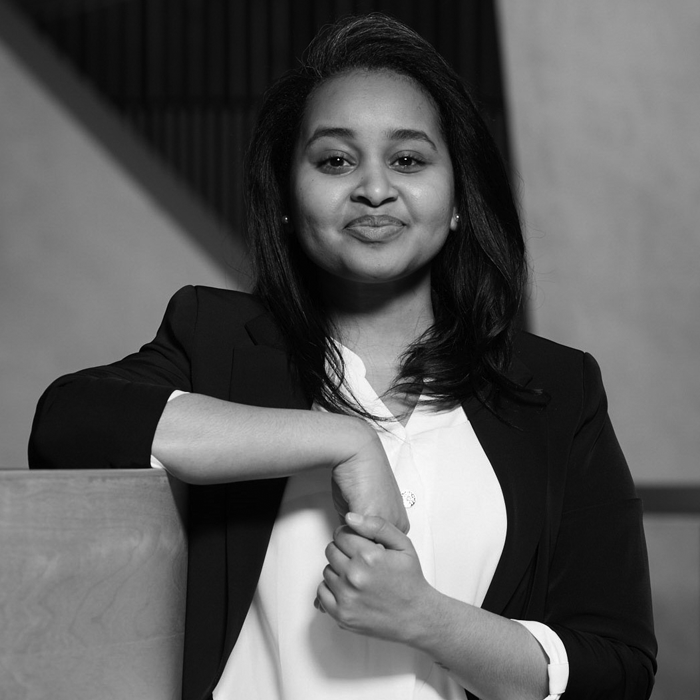
Reem Khalil’s experience in the public and private sectors as an IT governance practitioner and a socio-technical researcher brings a unique perspective to her work. Khalil’s research focuses on the political and social context of information systems design choices in Africa, as exemplified in her publication on e-democracy in the case of the Kenyan Integrated Elections Management System. Khalil holds a master’s degree in Information Systems and Digital Innovation from LSE.
Through her research, Khalil strongly advocates for employing digital innovations to advance digital rights, provide equitable access, and strengthen communities.
Reem’s project aims to investigate the role of telecommunications infrastructure in disaster management within Sudan’s current conflict. It examines the intersection between technological capabilities, institutional barriers, and governance models that shape the effectiveness of these tools in creating digital resilience and supporting humanitarian efforts. This research bridges the gap between theoretical frameworks and practical considerations for ICT in emergencies.
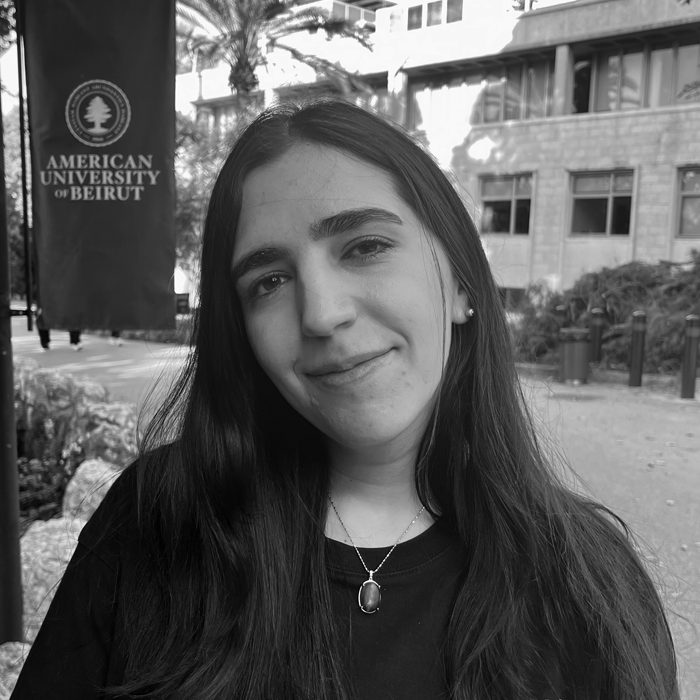
Siba Mroueh recently graduated with a Master’s degree in Anthropology of Politics, Violence, and Crime from University College London, with a focus on think-tanks operating in West Asia and North Africa. Previously, Siba studied Arabic Language and Literature and Sociology/Anthropology at the American University of Beirut. Furthermore, she co-founded, led, and participated in various political clubs and literature societies.
Siba Mroueh plans to focus on the issue of freedom of expression in Lebanon. For years, Lebanon has been a hub for intellectuals and activists in the region. Unfortunately, many activists have recently been summoned for investigation due to expressing their opinions on various topics online. In her project, she will examine cases where freedom of expression was violated in Lebanon. Siba will consult experts, activists, and lawyers to find ways to enhance freedom of expression in the country.


